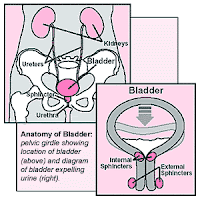Obesity Can Make you Pee Your Pants
Friday, May 2, 2008 Not a very pleasant picture: wetting your pants every time you laugh, sneeze, lift a heavy load, exercise, drink too much coffee – the medical term for this common but rarely talked about problem is urinary incontinence.
Not a very pleasant picture: wetting your pants every time you laugh, sneeze, lift a heavy load, exercise, drink too much coffee – the medical term for this common but rarely talked about problem is urinary incontinence.
For anatomical reasons, this problem (the involuntary leakage of urine) is largely limited to women.
Experts essentially speak of three common types of incontinence (there are others):
1) Stress incontinence: loss of small amounts of urine with coughing, laughing, sneezing, exercising or other movements that increase intraabdominal pressure and thus increase pressure on the bladder.
2) Urge incontinence: involuntary loss of urine often due to (nervous) overactivity of the bladder resulting in the sudden need or urge to urinate, sometimes after drinking a glass of water or even hearing the sound of running water.
3) Mixed incontinence: as the name says – when aspects of both forms of incontinence are present.
Obesity can not only increase the risk for urinary incontinence but also makes it worse in people who have it for other reasons (e.g. after childbirth).
So how strong is the link between urinary incontinence and obesity?
This was the question asked by Townsend and colleagues from Harvard in a recent article pulbished in OBESITY.
The researchers examined the associations of BMI and waist circumference with new-onset urinary incontinence among women aged 54-79 years in the Nurses’ Health Study. From 2000 to 2002, they identified 6,790 women who reported at least monthly episodes of incontinence among 35,754 women reporting no UI in 2000. They also looked at the type of incontinence in individuals who had at least weekly incontinence.
There were highly significant trends of increasing risk of urinary incontinence with increasing BMI and waist circumferenc. Women with a BMI>35 were around 70% more likely to have incontinence compared to women with BMI 21-22.9.
Interestingly, while BMI was associated with urge and mixed, but not stress incontinence, waist circumference was associated only with stress urinary incontinence.
Fortunately, urinary incontinence is a very treatable condition, whereby, when present, obesity treatment can have a significant benefit.
As I have noted before – obesity affects virtually every organ system. The distress of having obesity-related urinary incontinence can far outweigh the “inconvenience” of having high blood pressure or dyslipidemia.
Always important to remember, obesity is not just about the heart!
AMS
Edmonton, Alberta


